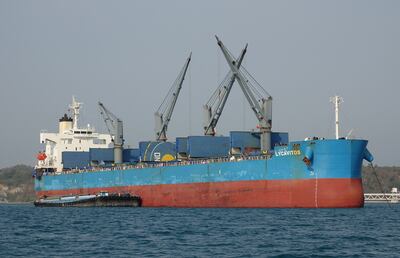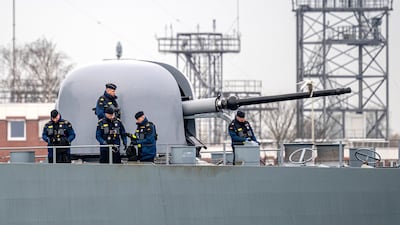Live updates: Follow the latest news on Israel-Gaza
The European Union launched a naval mission on Monday to protect Red Sea shipping from Yemen's Houthis, who claimed that a UK-registered ship they attacked was at risk of sinking.
“The operation will play a key role in safeguarding commercial and security interests, for the sake of the EU and the wider international community,” said the EU foreign affairs minister Josep Borrell.
Named Aspides, Greek for “shield”, the mission will be run from Larissa in central Greece under the operational command of Greek Commodore Vasilios Griparis and on-board command of Italian rear admiral Stefano Costantino.
The year-long mission will be a defensive operation to ensure freedom of navigation and protect merchant vessels. It will operate in close co-ordination with parallel operations including the US-led Prosperity Guardian, which includes some EU countries such as the Netherlands and France.
The EU had made it clear that it does not plan to participate in separate US-led attacks on Houthi military targets on Yemeni soil.
The Houthi attacks have so far not caused any ships to sink nor killed crew members. Yet reports of the possibility of a ship sinking on Monday have caused concern.
The Rubymar, a Belize-flagged, British-registered and Lebanese-operated general cargo ship, was hit by one of two ballistic missiles fired on Sunday night, according to the US Central Command.
“The ship was seriously hit, which caused it to stop completely. As a result of the extensive damage the ship suffered, it is now at risk of sinking in the Gulf of Aden,” Houthi military spokesman Yahya Sarea said, adding that the crew was safe.
The security firm LSS-SAPU, in charge of safety on the Rubymar, said the crew abandoned the ship after the attack and were picked up by another commercial ship, which took them to Djibouti.
“We know she was taking-in water,” the company's representatives told Reuters. “The owners and managers are considering options for towage.”
The UK Maritime Trade Organisation said the ship was hit about 60 kilometres south of the Yemeni port city of Mokha.
In a separate incident, a Greek-flagged, US-owned cargo ship was attacked twice in two hours in the Gulf of Aden, which adjoins the Red Sea, maritime security firm Ambrey said.
No injuries or damage were reported and the ship was continuing its journey to Aden, the report said.
The Houthis have said their harassment campaign is aimed at pressuring Israel into a ceasefire in its retaliatory war in Gaza after the Hamas-led October 7 attacks.

But western officials have described their operations as an opportunistic move aimed at raising their international profile with serious consequences for the freedom of navigation.
“The whole world economy is being affected,” said German Foreign Affairs Minister Annalena Baerbock as she arrived at a meeting with her EU counterparts in Brussels.
“It is not just European ships that are repeatedly being endangered by Houthi rockets, but it affects all of international shipping – ships from Asia, ships from Africa, and it especially effects the Gulf states because their harbours can no longer be sailed to,” said Ms Baerbock.
Austria's Foreign Affairs Minister Alexander Schallenberg compared the impact of the war in Ukraine to the conflict in Gaza.
“It is very important that this [Aspides] mission exists. It is, perhaps, a sign of the 21st century – most conflicts are not regional,” Mr Schallenberg said.
“Just as the Russian war of aggression had global effects – think of grain, think of energy – it is the same now in the Middle East,” he said.
“The conflict in Gaza has effects because it affects supply chains, because the Houthis think they should make their mark with rocket attacks on civilian shipping in the Red Sea. Therefore, it is important that we show our colours.”
Details of the mission have yet to be hammered out but the plan is to have four vessels posted in the region, an EU official said.
France, Germany, Italy and Belgium have said they plan to contribute ships.
Danish, Spanish and Greek ships are also present in the region but this does not mean they have confirmed participation in Aspides, the official said.
The mission aims at deterring drone attacks and escorting ships, whatever their nationality.
“If a missile is coming or a drone is coming, we will defend [the ship] and act in self defence,” said the official. “If we see and have information about threats, we can share that information but we are not offensively neutralising a threat on land.”

